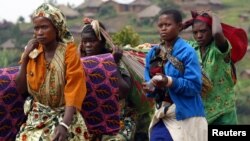KINSHASHA —
On bustling Route Matadi in the Mbinza-Barré district of Kinshasa, the capital of the Democratic Republic of Congo, traffic speeds along as people go about the daily business of their lives.
In one unassuming building, the U.N. Stabilization Mission in Congo, known by its French acronym MONUSCO, has been working with a local NGO to provide a group of women with skills that can translate to the marketplace.
Ranging in age from 17 to 40, the 50 women receive training in computers, marketing, sewing and English.
Part of a three-month pilot program called a “quick impact project,” it costs about $30,000. Course participants such as Annie Kika says she is grateful for the training and that she'd like to see more programs of this kind.
According to Laure Gnassou, a MONUSCO economic affairs officer, the main criterion for choosing participants is motivation.
So far no one has dropped out, but only four women passed a hiring exam given by a local recruiting firm at the program's conclusion. All four have since found jobs, with one starting Monday at the Bank of Africa. The other three have been hired as sales representatives at private companies.
Gnassou says she is not disappointed by the low passing rate.
“You are in a very under-privileged area," she said. "Education — knowing how to write, to do calculations — it's not so easy, so you have to take that into consideration.”
One woman who did not pass the recruiting exam, 35-year-old Nanette Kabalu Mwamba, a mother of four, says she hopes she will get a second chance to take the test.
But regardless of whether they pass, most participants say they still benefit from the training.
While rich in mineral resources and possessing great economic potential, Congo suffers from instability, poor governance, lack of infrastructure, widespread poverty and rampant unemployment.
Gilbert Yegani, CEO of G.H. Investment, one of the companies that partnered with MONUSCO, said he has spoken to the women about marketing and entrepreneurship and encouraged them to start their own small companies, saying it is better to create jobs than to wait to be hired in this economic climate.
“Some will find employment in existing companies, but my expectation is the one who learns how to make a dress using a sewing machine can become by themselves an owner of a small enterprise making fabrics as you are seeing," he said. "Some will create a cyber cafe, a training center for her IT [information technology], that's what we are expecting.”
Yegani says the women will need equipment, such as computers and sewing machines, which the private sector will try to help them find funding for, or obtain loans from a micro-lender.
Despite the challenges, MONUSCO's Gnassou is optimistic about the pilot program, and says sustainable economic growth will not come from international donors, but from the strength of Congo's private sector.
In one unassuming building, the U.N. Stabilization Mission in Congo, known by its French acronym MONUSCO, has been working with a local NGO to provide a group of women with skills that can translate to the marketplace.
Ranging in age from 17 to 40, the 50 women receive training in computers, marketing, sewing and English.
Part of a three-month pilot program called a “quick impact project,” it costs about $30,000. Course participants such as Annie Kika says she is grateful for the training and that she'd like to see more programs of this kind.
According to Laure Gnassou, a MONUSCO economic affairs officer, the main criterion for choosing participants is motivation.
So far no one has dropped out, but only four women passed a hiring exam given by a local recruiting firm at the program's conclusion. All four have since found jobs, with one starting Monday at the Bank of Africa. The other three have been hired as sales representatives at private companies.
Gnassou says she is not disappointed by the low passing rate.
“You are in a very under-privileged area," she said. "Education — knowing how to write, to do calculations — it's not so easy, so you have to take that into consideration.”
One woman who did not pass the recruiting exam, 35-year-old Nanette Kabalu Mwamba, a mother of four, says she hopes she will get a second chance to take the test.
But regardless of whether they pass, most participants say they still benefit from the training.
While rich in mineral resources and possessing great economic potential, Congo suffers from instability, poor governance, lack of infrastructure, widespread poverty and rampant unemployment.
Gilbert Yegani, CEO of G.H. Investment, one of the companies that partnered with MONUSCO, said he has spoken to the women about marketing and entrepreneurship and encouraged them to start their own small companies, saying it is better to create jobs than to wait to be hired in this economic climate.
“Some will find employment in existing companies, but my expectation is the one who learns how to make a dress using a sewing machine can become by themselves an owner of a small enterprise making fabrics as you are seeing," he said. "Some will create a cyber cafe, a training center for her IT [information technology], that's what we are expecting.”
Yegani says the women will need equipment, such as computers and sewing machines, which the private sector will try to help them find funding for, or obtain loans from a micro-lender.
Despite the challenges, MONUSCO's Gnassou is optimistic about the pilot program, and says sustainable economic growth will not come from international donors, but from the strength of Congo's private sector.




